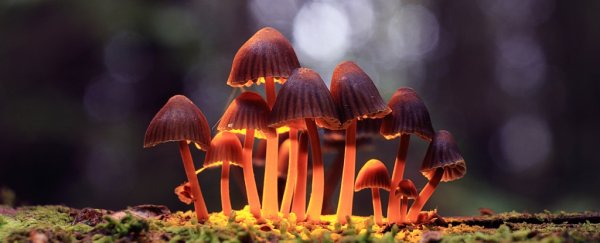Psychedelics have recently made headlines for their potential to treat illnesses such as depression and cluster headaches - and now a now study has found that drugs such as magic mushrooms, LSD, and the active ingredient in peyote could potentially offer a way to prevent violent crime.
A team of researchers looked at 13 years worth of data from the US National Survey on Drug Use and Health across 480,000 respondents, and found that having ever used psychedelic drugs contributed to significant decreases in the odds that that individual would later commit a crime.
Psychedelic, or hallucinogenic, drugs are substances that alter your perceptions of the world around you.
Magic mushrooms (which trigger hallucinations through the ingredient psilocybin), LSD, and peyote (which contains the hallucinogen mescaline) are often used recreationally, and have been used for religious purposes for centuries.
Now there's a growing body of research that suggests they may also be powerful medical tools.
LSD has proven effective at reducing cluster headaches, for instance. Psilocybin has demonstrated, several times, that it can ease the symptoms of severe depression and anxiety. However, they're still classed as Schedule 1 drugs in the US - with no currently accepted medical use, and therefore illegal.
Yet in a slightly ironic twist, the numbers suggest that there is actually some connection between lower crime rates and psychedelic use - in particular, psilocybin, according to the results of the study.
People who reported having ever used psychedelic drugs had: a 27 percent decrease in the likelihood of committing larceny or theft; a 22 percent decrease in the odds of arrest for property crime; an 18 percent decrease in the odds of arrest for violent crime; and a 12 percent decrease in the odds for committing assault.
On the flip side, use of other, non-psychedelic illicit substances correlated with increased odds of criminal behaviour, the study found.
"These findings are consistent with a growing body of research suggesting classic psychedelics confer enduring psychological and prosocial benefits," said lead researcher Peter Hendricks of the University of Alabama in Birmingham.
What these drugs do to the brain is fascinating. On both LSD and psilocybin, regions of the brain that don't usually interact start doing so, and the region of the brain associated with a sense of self becomes suppressed.
We also know that long-term personality changes may follow just one trip.
The researchers hope that this finding will open the door to clinical research into the use of psychedelics to prevent crime, aimed at groups at high risk of criminal behaviour, such as potential recidivists.
"Our findings suggest the protective effects of classic psychedelic use are attributable to genuine reductions in antisocial behavior rather than reflecting improved evasion of arrest," Hendricks said.
"Simply put, the positive effects associated with classic psychedelic use appear to be reliable. Given the costs of criminal behavior, the potential represented by this treatment paradigm is significant."
The research has been published in the Journal of Psychopharmacology.
